

Her talk on sustainability in medical imaging and planetary health was both inspiring and practical.
Excited to keep pushing these conversations forward here in Calgary!🌱 🩻 🌎

Her talk on sustainability in medical imaging and planetary health was both inspiring and practical.
Excited to keep pushing these conversations forward here in Calgary!🌱 🩻 🌎
🚙 Cars? Among the least.
E-bike: 20–30 Wh/km [1]
Walking: 50–70 Wh/km [2]
Light rail: 80–120 Wh/km [3]
EV car: 150–200 Wh/km [4]
Gas car: 600–800 Wh/km [5]
Imagine if we built our cities around the most efficient ride.

🚙 Cars? Among the least.
E-bike: 20–30 Wh/km [1]
Walking: 50–70 Wh/km [2]
Light rail: 80–120 Wh/km [3]
EV car: 150–200 Wh/km [4]
Gas car: 600–800 Wh/km [5]
Imagine if we built our cities around the most efficient ride.
they’d still end up as stranded assets as the world moves on to cleaner (and cheaper) energy.
One of the biggest mistakes fossil fuel execs can make is
equating SHORT-TERM PROFITS with LONG-TERM REALITY!

they’d still end up as stranded assets as the world moves on to cleaner (and cheaper) energy.
One of the biggest mistakes fossil fuel execs can make is
equating SHORT-TERM PROFITS with LONG-TERM REALITY!
This isn’t just feel-good symbolism. It pressures other to follow.
🇳🇴 Take Norway: 0.1% of global emissions. But >80% of new cars EVs sends a powerful message: If a northern petrostate can, hard for other nations to argue its “not feasible”.

This isn’t just feel-good symbolism. It pressures other to follow.
🇳🇴 Take Norway: 0.1% of global emissions. But >80% of new cars EVs sends a powerful message: If a northern petrostate can, hard for other nations to argue its “not feasible”.
CO₂ lingers for decades, continuing to warm the planet. Many wealthy “<2%” nations have a higher share of 𝘤𝘶𝘮𝘶𝘭𝘢𝘵𝘪𝘷𝘦 emissions.
Wealthy nations built their wealth by burning fossil fuels—now they have a responsibility to invest in clean energy.

CO₂ lingers for decades, continuing to warm the planet. Many wealthy “<2%” nations have a higher share of 𝘤𝘶𝘮𝘶𝘭𝘢𝘵𝘪𝘷𝘦 emissions.
Wealthy nations built their wealth by burning fossil fuels—now they have a responsibility to invest in clean energy.
The driving force behind this? Increased deployment and economies of scale.
So Canada’s solar does more than reduce domestic emissions—it send a signal to global markets, encouraging investment in solar elsewhere.

The driving force behind this? Increased deployment and economies of scale.
So Canada’s solar does more than reduce domestic emissions—it send a signal to global markets, encouraging investment in solar elsewhere.
The “we’re negligible” argument assumes only domestic emissions count, which isn’t the case. Global markets and politics are connected.
When countries adopt clean tech, costs go down worldwide, shaping 𝘦𝘷𝘦𝘳𝘺𝘰𝘯𝘦’𝘴 emissions.
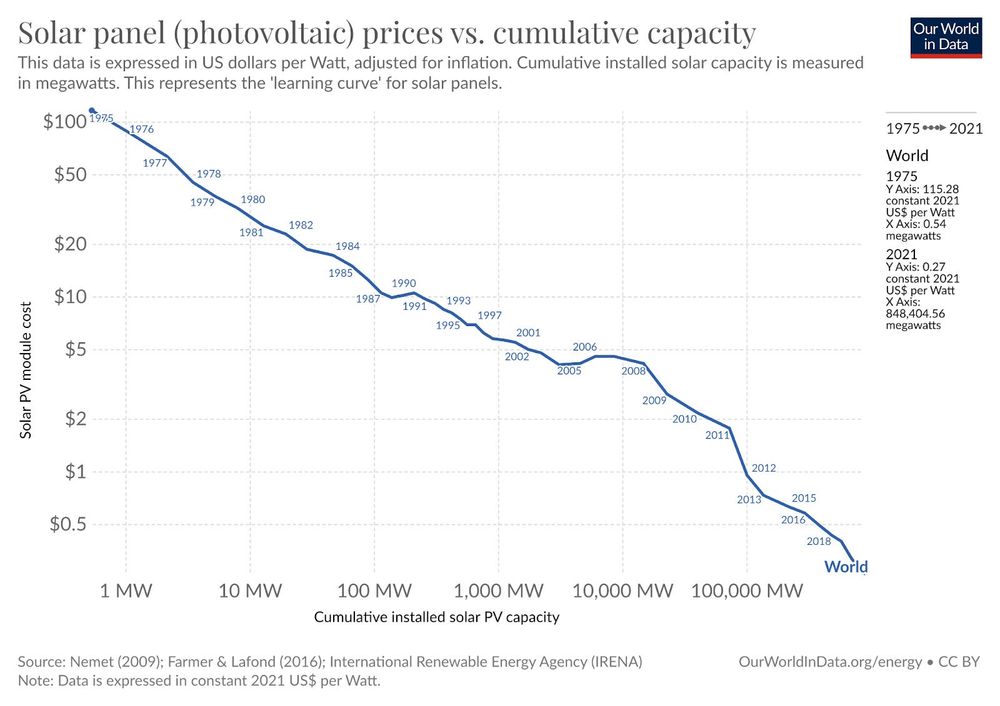
The “we’re negligible” argument assumes only domestic emissions count, which isn’t the case. Global markets and politics are connected.
When countries adopt clean tech, costs go down worldwide, shaping 𝘦𝘷𝘦𝘳𝘺𝘰𝘯𝘦’𝘴 emissions.
🗳️ It’s like voting: one ballot rarely decides an election. But if everyone thinks “my vote doesn’t matter,” democracy collapses.

🗳️ It’s like voting: one ballot rarely decides an election. But if everyone thinks “my vote doesn’t matter,” democracy collapses.
Only 6 countries on Earth have a >2% share of emissions.
𝘌𝘷𝘦𝘳𝘺 𝘰𝘵𝘩𝘦𝘳 𝘤𝘰𝘶𝘯𝘵𝘳𝘺 emits <2% and might consider themselves to be “negligible”. But together, these “small” emitters make up 36% of global CO₂—more than China.

Only 6 countries on Earth have a >2% share of emissions.
𝘌𝘷𝘦𝘳𝘺 𝘰𝘵𝘩𝘦𝘳 𝘤𝘰𝘶𝘯𝘵𝘳𝘺 emits <2% and might consider themselves to be “negligible”. But together, these “small” emitters make up 36% of global CO₂—more than China.
Its a familiar argument:
“𝙊𝙪𝙧 𝙘𝙤𝙪𝙣𝙩𝙧𝙮’𝙨 𝙚𝙢𝙞𝙨𝙨𝙞𝙤𝙣𝙨 𝙖𝙧𝙚 𝙣𝙚𝙜𝙡𝙞𝙜𝙞𝙗𝙡𝙚. 𝙄𝙩 𝙙𝙤𝙚𝙨𝙣’𝙩 𝙢𝙖𝙩𝙩𝙚𝙧 𝙬𝙝𝙖𝙩 𝙬𝙚 𝙙𝙤.”
And I get it—graphs like this 𝘤𝘢𝘯 make us feel powerless.
But here’s why our actions 𝘥𝘰 matter: 🧵

Its a familiar argument:
“𝙊𝙪𝙧 𝙘𝙤𝙪𝙣𝙩𝙧𝙮’𝙨 𝙚𝙢𝙞𝙨𝙨𝙞𝙤𝙣𝙨 𝙖𝙧𝙚 𝙣𝙚𝙜𝙡𝙞𝙜𝙞𝙗𝙡𝙚. 𝙄𝙩 𝙙𝙤𝙚𝙨𝙣’𝙩 𝙢𝙖𝙩𝙩𝙚𝙧 𝙬𝙝𝙖𝙩 𝙬𝙚 𝙙𝙤.”
And I get it—graphs like this 𝘤𝘢𝘯 make us feel powerless.
But here’s why our actions 𝘥𝘰 matter: 🧵

Exxon in 2000: Who can really say if fossil fuels are warming the planet, the science is just too complicated to know. 🤷♂️
Exxon now: Okay you were right. But we are totally going to techno-fix it now! 😇



Exxon in 2000: Who can really say if fossil fuels are warming the planet, the science is just too complicated to know. 🤷♂️
Exxon now: Okay you were right. But we are totally going to techno-fix it now! 😇
Cool — so I guess you also don’t care about Leo’s yacht or Taylor’s private jet either, since those are a drop in the bucket too.
What’s that? It’s unfair for 𝘰𝘯𝘦 𝘱𝘦𝘳𝘴𝘰𝘯 to have such high emissions?
Funny how per-capita suddenly matters now.

Cool — so I guess you also don’t care about Leo’s yacht or Taylor’s private jet either, since those are a drop in the bucket too.
What’s that? It’s unfair for 𝘰𝘯𝘦 𝘱𝘦𝘳𝘴𝘰𝘯 to have such high emissions?
Funny how per-capita suddenly matters now.
(Never mind the fact that 400 people live there.)


(Never mind the fact that 400 people live there.)
🗺️ 1: Where people live (population density, 2025).
🗺️ 2: Where people are most vulnerable to climate change (IPCC, 2022)
What happens when the 𝙢𝙤𝙨𝙩 𝙥𝙤𝙥𝙪𝙡𝙖𝙩𝙚𝙙 𝙧𝙚𝙜𝙞𝙤𝙣𝙨 also become the 𝙡𝙚𝙖𝙨𝙩 𝙝𝙖𝙗𝙞𝙩𝙖𝙗𝙡𝙚?
🌍 Mass migration
🌾 Food insecurity
⚔️ Conflicts
🧭 Global instability

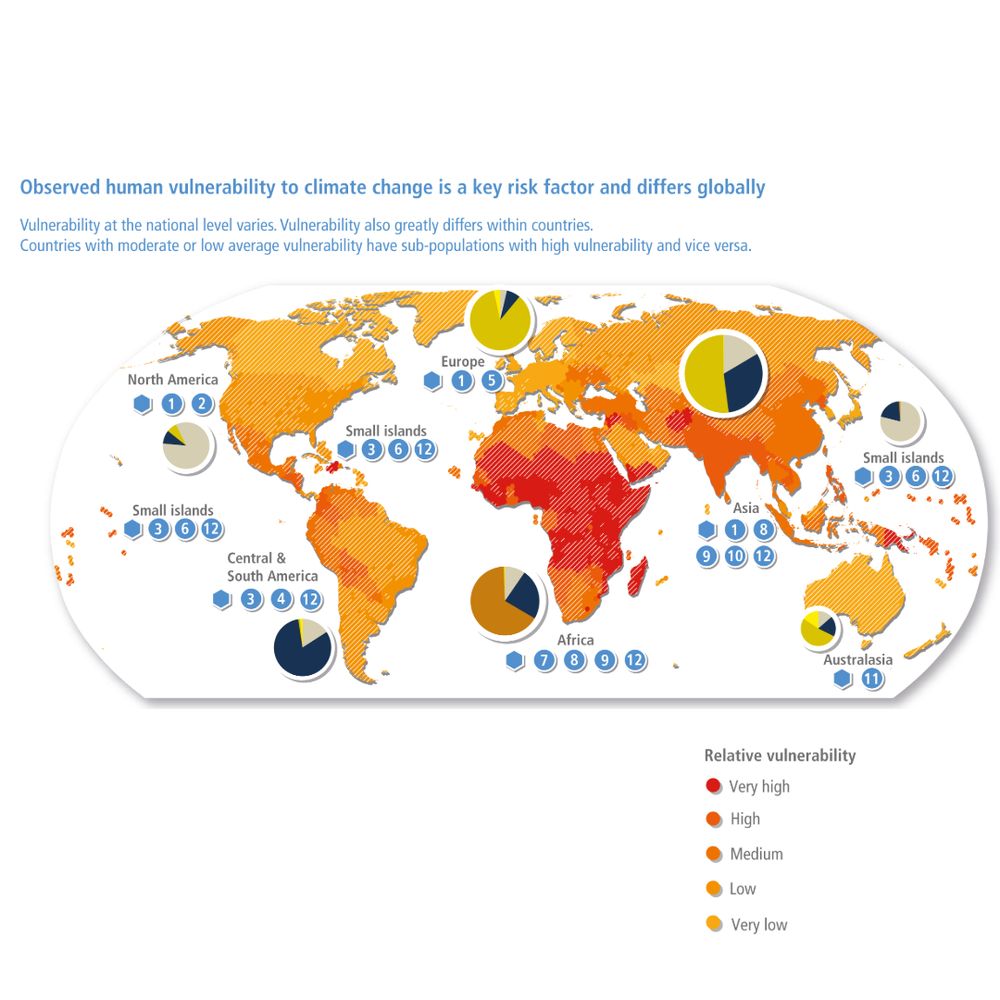
🗺️ 1: Where people live (population density, 2025).
🗺️ 2: Where people are most vulnerable to climate change (IPCC, 2022)
What happens when the 𝙢𝙤𝙨𝙩 𝙥𝙤𝙥𝙪𝙡𝙖𝙩𝙚𝙙 𝙧𝙚𝙜𝙞𝙤𝙣𝙨 also become the 𝙡𝙚𝙖𝙨𝙩 𝙝𝙖𝙗𝙞𝙩𝙖𝙗𝙡𝙚?
🌍 Mass migration
🌾 Food insecurity
⚔️ Conflicts
🧭 Global instability
And pointing out this extremely obvious fact doesn’t make me an extremist. It makes me honest.
8/n
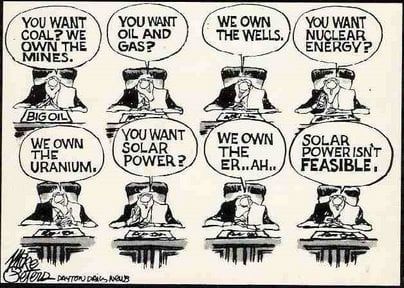
And pointing out this extremely obvious fact doesn’t make me an extremist. It makes me honest.
8/n
It’s like giving tobacco companies billions to invent a “safer cigarette filter” while ignoring the obvious alternative: just stop smoking.
7/n

It’s like giving tobacco companies billions to invent a “safer cigarette filter” while ignoring the obvious alternative: just stop smoking.
7/n
Why? When the clean, proven, cheaper alternative is already orbiting above us every single day?
6/n

Why? When the clean, proven, cheaper alternative is already orbiting above us every single day?
6/n
Yes, uranium must be mined — but it’s 𝙢𝙞𝙡𝙡𝙞𝙤𝙣𝙨 𝙭 𝙢𝙤𝙧𝙚 𝙚𝙣𝙚𝙧𝙜𝙮-𝙙𝙚𝙣𝙨𝙚 than fossil fuels. 🪨⚛️ 💪
#ClimateSky

Yes, uranium must be mined — but it’s 𝙢𝙞𝙡𝙡𝙞𝙤𝙣𝙨 𝙭 𝙢𝙤𝙧𝙚 𝙚𝙣𝙚𝙧𝙜𝙮-𝙙𝙚𝙣𝙨𝙚 than fossil fuels. 🪨⚛️ 💪
#ClimateSky
Alberta can do the same. We have the talent, tools, and capital to lead in clean energy—if we stop doubling down on the past and start building what’s next. ⚡️🔋☀️
#energytransition #climatesky

Alberta can do the same. We have the talent, tools, and capital to lead in clean energy—if we stop doubling down on the past and start building what’s next. ⚡️🔋☀️
#energytransition #climatesky

Her message:
• You are 𝘯𝘰𝘵 𝘢𝘭𝘰𝘯𝘦 in climate anxiety.
• It is 𝘳𝘢𝘵𝘪𝘰𝘯𝘢𝘭.
• Most people 𝘥𝘰 care — just don’t know what to do.
• Talk about it.
Bonus: CCUS & DAC = niche last-resorts, not silver bullets.
Extra bonus: she complimented my SDG pin 🤓
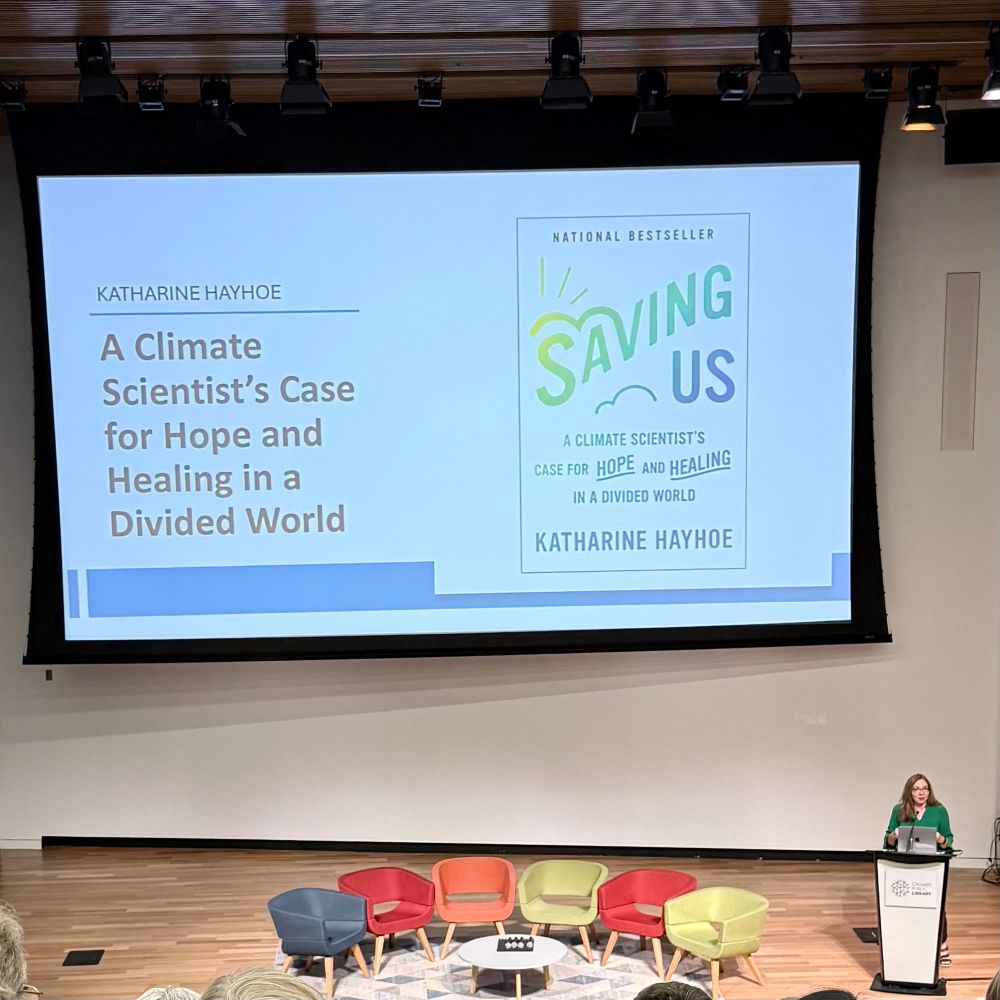
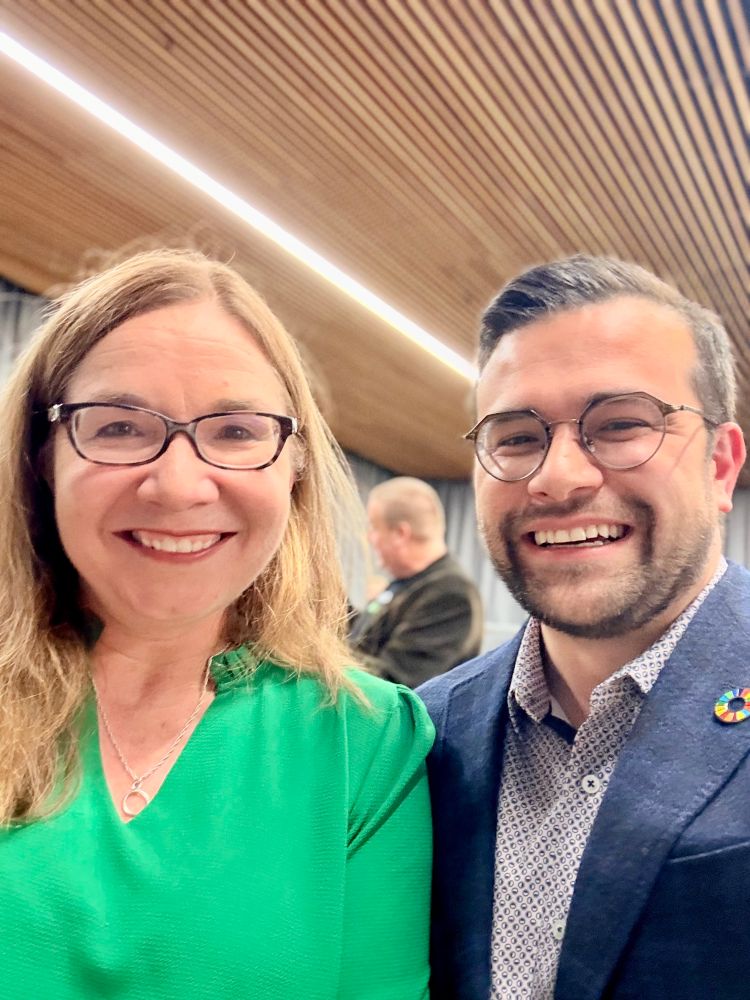
Her message:
• You are 𝘯𝘰𝘵 𝘢𝘭𝘰𝘯𝘦 in climate anxiety.
• It is 𝘳𝘢𝘵𝘪𝘰𝘯𝘢𝘭.
• Most people 𝘥𝘰 care — just don’t know what to do.
• Talk about it.
Bonus: CCUS & DAC = niche last-resorts, not silver bullets.
Extra bonus: she complimented my SDG pin 🤓
It means:
🏭 Naming 𝘧𝘰𝘴𝘴𝘪𝘭 𝘧𝘶𝘦𝘭𝘴 as the 𝐩𝐫𝐢𝐦𝐚𝐫𝐲 𝐝𝐫𝐢𝐯𝐞𝐫
☀️ Naming 𝘤𝘭𝘦𝘢𝘯 𝘦𝘯𝘦𝘳𝘨𝘺 as the 𝐬𝐨𝐥𝐮𝐭𝐢𝐨𝐧
Yes, agriculture, land use, and carbon capture matter. But don’t lose the plot:
𝗖𝗹𝗶𝗺𝗮𝘁𝗲 𝗰𝗵𝗮𝗻𝗴𝗲 𝗶𝘀, 𝗼𝘃𝗲𝗿𝘄𝗵𝗲𝗹𝗺𝗶𝗻𝗴𝗹𝘆, 𝗮 𝗳𝗼𝘀𝘀𝗶𝗹 𝗳𝘂𝗲𝗹 𝗽𝗿𝗼𝗯𝗹𝗲𝗺.

It means:
🏭 Naming 𝘧𝘰𝘴𝘴𝘪𝘭 𝘧𝘶𝘦𝘭𝘴 as the 𝐩𝐫𝐢𝐦𝐚𝐫𝐲 𝐝𝐫𝐢𝐯𝐞𝐫
☀️ Naming 𝘤𝘭𝘦𝘢𝘯 𝘦𝘯𝘦𝘳𝘨𝘺 as the 𝐬𝐨𝐥𝐮𝐭𝐢𝐨𝐧
Yes, agriculture, land use, and carbon capture matter. But don’t lose the plot:
𝗖𝗹𝗶𝗺𝗮𝘁𝗲 𝗰𝗵𝗮𝗻𝗴𝗲 𝗶𝘀, 𝗼𝘃𝗲𝗿𝘄𝗵𝗲𝗹𝗺𝗶𝗻𝗴𝗹𝘆, 𝗮 𝗳𝗼𝘀𝘀𝗶𝗹 𝗳𝘂𝗲𝗹 𝗽𝗿𝗼𝗯𝗹𝗲𝗺.
New analysis in 𝘕𝘢𝘵𝘶𝘳𝘦 found over 2,200 papers in 2024 alone mining NHANES for statistically significant (but often meaningless) associations. Many articles formulaic, likely AI-generated.
📊 Tyler Vigen | 📰 bit.ly/4dxB1hK


New analysis in 𝘕𝘢𝘵𝘶𝘳𝘦 found over 2,200 papers in 2024 alone mining NHANES for statistically significant (but often meaningless) associations. Many articles formulaic, likely AI-generated.
📊 Tyler Vigen | 📰 bit.ly/4dxB1hK

